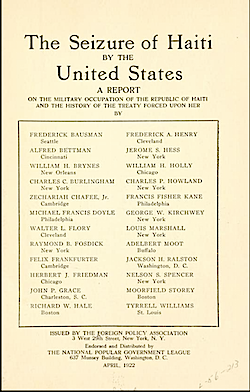While the caravan of aid that was donated by New York, New Jersey, and Connecticut residents was delayed due to bureaucratic/political machinations, many aid agencies who have been alerted to the dire straits in communities like Baie d'Orange in Haiti have jumped into the fray and are continuing to provide vitally important food and health aid to prevent more starvation deaths. Many hard hit victims in remote communities in Haiti have been unable to produce crops vital to their sustenance. All they ask is that they get the aid necessary to start producing for themselves. These small family farmers say that they need fertilizers as well as the seeds provided by an aid agency. AP reports that "U.N. Food and Agriculture Organization delivered seeds to about 400 families last month, and Oxfam is also distributing farm aid. But the farmers say they are not getting what they need most — supplies to restore their barren fields." In other hopeful news for Haitian children, today it was reported by the Miami Herald that 100 portable schools have been donated by Broward County School District in Miami Florida to help hurricane victims. The report says that "The Haitian government hopes to have a school campus created from old Broward school district portables by late January." The South Florida Sun-Sentinel reports that "A delegation on behalf of Haitian President Rene Preval attended Tuesday's board meeting to thank them for the donation." Among the Haitian legislators attending were Charles Manigat, minister of Haitians living overseas and Former education minister Leslie Voltaire, who said "the portables will also be used as health centers." AP's excellent article entitled "4-year-old Venecia helped by food aid in Haiti" provides more information about the humanitarian crisis in Haiti: Four tropical storms that killed 793 people in August and September and caused $1 billion in damage made Haiti's ongoing food crisis even worse. Crops were wiped out and mountain roads destroyed, cutting farmers off from markets where they sell their crops and buy food for their children.Agencies working in the remote village of Baie d'Orange to feed and care for residents are: Doctors Without Borders, Medicins du Monde, Terre des Hommes, U.N. World Food Program, Oxfam, Greater Works Outreach church in Monroeville, Pa., St. John's United Methodist Church in Turnersville, N.J. and a special thanks to U.S. Rep. Maxine Waters for her continued support and advocacy for Haiti. Congresswoman Waters was among the few international dignitaries to attended the 200th anniversary celebration of Haiti's independence in 2004. She was joined by former South African President Thabo MBeki, who's country agreed to give asylum to President Jean-Betrand Aristide after he was ousted in a U.S. sponsored coup on February 24, 2004. On Tuesday, Dec. 16, a rally was held to commemorate the 18th anniversary of the election of President Aristide. The rally was organized by Fanmi Lavalas. The marchers demanded the resignation of President Rene Preval. There were some reported clashes with Haitian police, but the march ended peacefully. UPDATE - 12.18.08: The following are excerpts from two articles about the reportedly 150,000 strong demonstration in Haiti on Tuesday. "Yesterday's commemoration of December 16 is but one of several reminders that Haitians have not forgotten what it is like to run their own country and tend to their own affairs. Contrary to popular belief, Haitians were not always forced to live off charity and rely upon the largess of foreign patrons. For most Haitians, their dream is that this nightmare will soon come to an end, and for better or worse, that they will once again be free to rise and fall based upon their own strengths and efforts. That simple freedom, which many of Haiti's patrons claim for themselves and take for granted, is the wellspring of dignity and self-sufficiency for any people. It is the real message of December 16 in Haiti." "According to our source, about 150,000 Haitians took part in a demonstration yesterday to mark the 18th anniversary of the ascension of president Aristide to power on December 16, 1990 as the first democratically and constitutionally elected president of Haiti. The demonstration was also a strong signal to the tiny minority that opposes the return of president Aristide to Haiti. The demonstrators demanded the return of Aristide, and they denounce the total disconnect of the current Haitian president Rene Preval with the Haitian people, where inflation, the living condition and insecurity make the country a living hell. Most Haitian people see Preval as a phantom. In the past 18 years Haiti has been hit by both man-made and natural disasters. On a personal note, on my last visit to Haiti in June 2007, a respected ex-government official and educator recounted how the French troops, upon arriving at Cap Haitian in two ships named after the defeated French Generals Leclerc and Rochambeau went about desecrating Haitian monuments with urine; took merchandise from street vendors and refusing to pay--advised the women to seek payment from Dessalines--using the most defamatory language imaginable. |
Tuesday, December 16, 2008
Baie d'Orange Starvation Victims
Get Food and Medical Aid
Labels:
aid,
Baie d'Orange,
haiti,
hurricanes,
starvation
Subscribe to:
Post Comments (Atom)






No comments:
Post a Comment